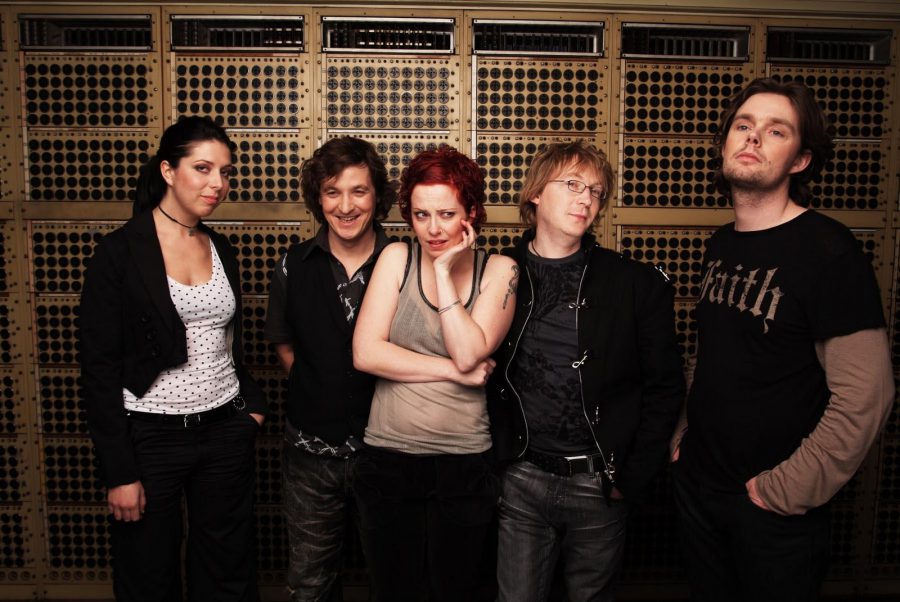
Pres photo The Gathering from 2006
In part 2 of this interview, Anneke discusses being a mother and a rock singer at the same time, why she likes her rock scene masculine, the genius of Devin Townsend, the super-coolness of hearing your own voice in the rides in Dutch theme park Efteling, and her social media approach. Also, for the first time ever in an interview, Anneke comments on her leaving The Gathering in 2007.
Be sure to read Part 1 of A random life – 25 years of Anneke van Giersbergen
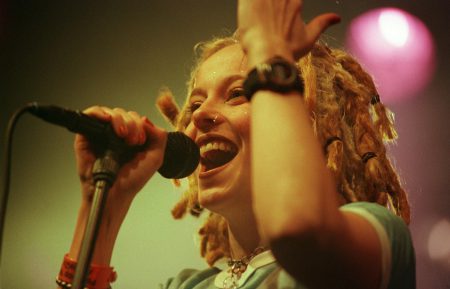
The Gathering 04-04-1999 at Paaspop, photo Peter Blok
Words: Mark van Schaick
Photography: Peter Blok, Dani Silvia & Bianca Berger
Video: Impressions of 2,5 years with Anneke van Giersbergen
Peter Blok has photographed Anneke van Giersbergen since her days with The Gathering and he kindly let us use some of his archive material for this two-part interview. On his website you can see a video compilation of what he calls “Impressions of 2,5 years with Anneke van Giersbergen”. From 2016 until the summer of 2018 Peter has filmed Anneke during, but also before and after, a variety of performances. As the intended documentary did not materialize, he has uploaded 21 episodes to Vimeo. A must for the fans!
A very popular ride
Do you come from a catholic background?
“Yeah, we went to church when my brother and I were really young. But nothing really heavy. Now I go to church when I’m on tour. I go visit local churches and Maria statues. I’m a big fan of Maria. I always light a candle and such. Other than that, I don’t really go to church, but I do believe and I’m quite religious. I believe in the cosmos and I believe in God and the big energy that helps us. I believe that we are not alone. I believe in angels; I believe there’s always angels to help us here. But not like I was taught in school, you know, with ‘Hail Jesus’ et cetera. We all try to give it a form, that’s why there are all these religions. But I believe it’s all the same. It’s all about this big source and I do believe in that big source.”
Which brings me to the Efteling theme park!
“Haha, yeah! That’s also a big source. Of fun!”
A small step, but another thing that I don’t really understand. I’ve never been a fan of the Efteling and I’m not a theme park kind of person. But I understand that working for them pays the bills. Or is it more?
“I love the Efteling! Haha, I sound like a kid when I talk like this. But I happen to know the guy who writes most of the music for the Efteling, René Merkelbach. And he sometimes asks me to sing these little parts. Leads and backgrounds, or choir things too. And I get paid, but only a little, so it’s not like it’s a big job for me.”
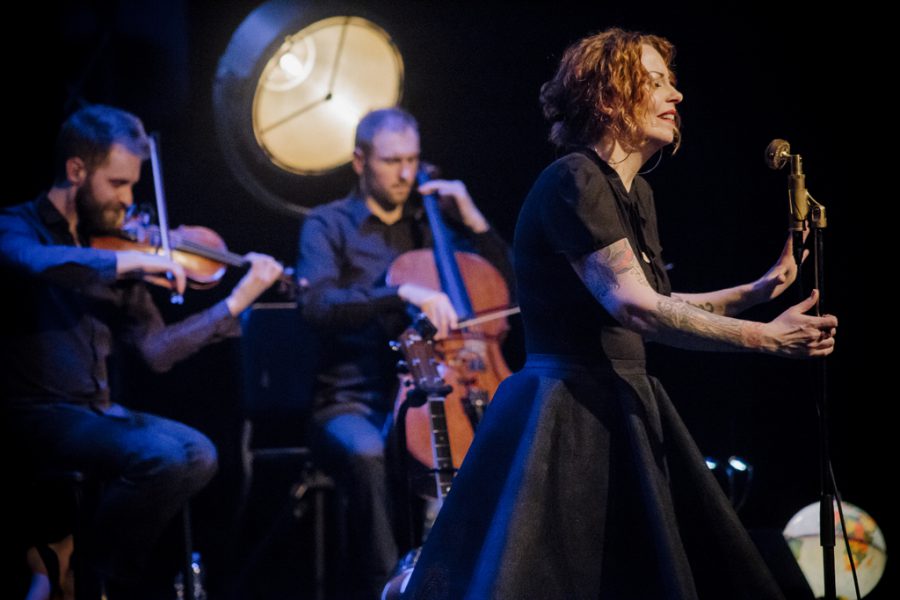
Anneke van Giersbergen in Sneek, photo Dani Silvia
Not like you have royalties coming in every year?
“Oh I wish! Thát would be next level. No, it’s really for fun and I like working with René very much. He’s a good musician. We wrote together for my album as well, one time. I did the operatic voice in the Baron 1898, for example. That’s a very popular ride, everybody in Holland knows the Baron. And I’m all over it! You can hear me outside, throughout the whole story and during the big drop during the ride. If I would go to HEMA now and tell shoppers it’s me, singing in the Baron, they would go ‘Really?!’ So there: everybody knows me, but nobody knows me. Sometimes when I do a gig for people who don’t really know about me or my background, I sing a little piece of that.”
Did René ever think of bringing the music from the Efteling to theatres?
“Oh, the Efteling does that already. They have the big shows in their theatre, but I’ve never been asked to perform. I’m only a small part of the whole thing. René has his own singer who does a lot of stuff for him and sometimes he asks me, because he needs a special sound, or because he knows I can do certain parts. I like the fact that when you walk through the park you can hear my voice, every day of the year! Funny and supercool.”
Recording twelve to fourteen hours a day
In my mind it’s not that big of a step from the operatic stuff of the Efteling to the operatic stuff written by Devin Townsend. Some of his music is over the top, very orchestrated and such. How would you describe your working relationship with him?
“Devin is unique. He’s highly intelligent, so his mind is racing all the time, with thoughts, music, emotions, everything. He has the ability, physically and mentally, to work all the time. He creates, he performs, he creates, he performs, and so on. And then he has this huge, genius creativity. Whatever he thinks and feels, he can put into music, melody, lyrics, ideas. That sums him up, I think. It makes him a very intricate, complex man. But on the other hand, he likes fart and poop jokes – and he’s always joking. He likes to work fast and he always knows exactly what he wants. And that’s why I like him so much. When I go there, he knows exactly what he needs from me and I can deliver. That sums him up.”
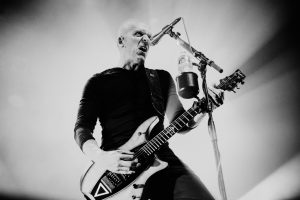
Devin Townsend in 013, photo Dani Silvia
The first time you worked with him, was it like any other guest role you have had?
“No. Do you know how we got to know each other? He used to be signed to Century Media as well, with Strapping Young Lad, back then. He knew The Gathering and he knew my name. When I went solo and I played in Chile, in Santiago, I played a cover of Hyperdrive, you know, from the Ziltoid The Omniscient album. There was a YouTube video of the performance, and I thought I’d just send that video to him, to let him know that I love his music. I e-mailed my German record company contact with the request to pass the YouTube-link on to Devin. I immediately got a reply saying that Devin was sitting next to him in some dressing room in Oslo. Crazy, right? The next moment Devin is calling me and asking me to sing on his album. Two months later I’m in Vancouver, recording.”
So, if you had not done that cover song, or had sent an e-mail to make him aware of you…
“…he wouldn’t have thought of me. And we hit it off really good. We’d record all day for Addicted, his Devin Townsend Project album, then we’d go to eat, and in the evening work on songs for me. We wrote two or three of them for my album In Your Room in these days. That was like six days of work, twelve to fourteen hours a day. With a jetlag, of course. You come in, you start recording. Crazy. I did a lot of vocals, then. I specifically have to mention the version of Hyperdrive, recording that one for Addicted was so cool! From then on, we became good friends and we stayed in touch and every time he needs me, I go over there.”
Does that mean you give each other feedback on music as well? Do you ask each other for opinions?
“I ask for his opinion, but Devin doesn’t need anybody’s opinion. I don’t see myself commenting on his music, really – well, I can bring something up when we record – but he has such a clear idea always, when he records.”
And he’s probably always two steps ahead already…
“Totally, he’s so fast. And in addition, he’s a fantastic singer! He has this opera voice. He could be a tenor in the opera. He’s metal, but he could do anything. I really admire him for his voice as well.”

Anneke van Giersbergen, photo Dani Silvia
A happy mother is a good mother
What did motherhood bring to your music? I remember coming to the The Gathering recording sessions for your album Home of 2005, in an old theatre in the town of Maurik, and seeing you and Rob with little Finn there. Not much is said about rock singers as mothers. Do you have any thoughts on that? Is it something that should stay private?
“No! It has a big influence on your life. In a practical sense, but also considering your emotionality and the way you grow as a person. You change in many ways when you’re a mother. And when I had just become a mother, everybody said: ‘Now you’re just going to write songs about your son, or about motherhood’. But I rarely did. I was way too busy being a mother, figuring out how to combine it with the random lifestyle we had…”
Did you ever think that your career was over?
“Well, I heard my dad say to family members: ‘She has a kid now… She’ll stop making music’. Which surprised me, because I’ve always been making music, since I was very little. This is what I do. Even when it’s hard with planning sometimes – every working mom needs planning, has babysitters during work hours. My work hours are random, but it doesn’t get weirder than that. You make it work, right? Because a happy mother is a good mother. But yeah, a lot of people were thinking that I would calm down. But I never thought about doing something else. You have to work anyways, so why not do something that you truly love? It’s just tricky when sometimes you’re away for a night, or for a week, or for a few weeks.”
When did you start writing about your experiences as a mother?
“After a few years. Because then I really got to know Finn as a person. When your son is a baby you are overwhelmed with emotions, but you don’t know him as a person yet. My writing did already change a little bit, however. Everything I did got intensified. Being with Finn was intense, you just experience everything in an intense way. But when I was not with Finn, when I was on tour or away, thát was intense. Because when I’m away from him, I feel that everything I do has to make sense. I can’t fuck around anymore. Everything I do has to be with a certain amount of intensity, otherwise it’s not worth it, leaving Finn for just a day or for weeks. So that’s how life changed for me. Nowadays I’m even more sucked into what I am doing. I’m trying to make the best choices in life, which benefit Finn or our family life.”
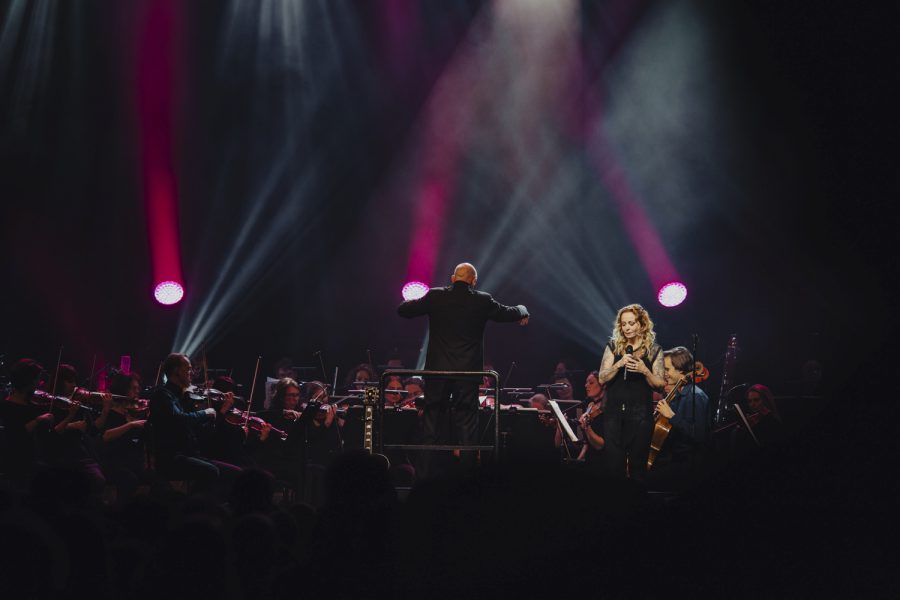
Anneke van Giersbergen in 013, photo Dani Silvia
Do you discuss motherhood with others in the business? Is it, especially in rock, something that stays hidden?
“In a way, yes. I think I’m one of the few singers who are totally open about being a mother. There aren’t that many women, of course, in metal. My friends who are singers in the metal scene, they all have kids. But I’m the only one putting pictures of my son online. And I know Finn doesn’t like it at the moment, and if I ask him and he doesn’t want me to, I won’t. I believe that other women don’t put their pictures online out of fear. They want to keep things private. They also have big name bands and have more fans than me.”
Maybe they believe that showing that you are a mother takes some of the magic away, that surrounds their bands, or band life.
“No, I think they’re afraid that people will do something with it. Because, for instance, Simone from Epica does post pictures of her and her child, but the little one’s face is always covered. Whereas I don’t have that fear. I’m very open about everything in my life. The other girls are much more reserved, with their fans as well. They’re afraid to get ill on tour. Me too, of course, but I love hugging and I wash my hands a lot, haha. So, there’s a difference between me and the other women in the scene that I regularly talk to.”
Staring at their own feet
You mentioned those singers. It’s an incredibly strong movement that you started with The Gathering, if I may be so bold to state it that way.
“Yeah, I’m proud of that!”

The Gathering at Dynamo Open Air 1999, photo Peter Blok
Without you singing with The Gathering, the whole female fronted singing business would be different. That’s a strong movement. Were you aware, alone or as part of a collective, of the power you brought to women in the rock world?
“No, not at that moment. When we started out, The Gathering was just looking for the best singer they could get. And I thought ‘Cool, a band to join!’ But then our sound got picked up really quick by a record company and people around us started saying how unique it was. They had females, like …, but they were more masculine females with vocals that were not melodic. As a lead singer you sometimes had some female vocals in the back and some keyboards. Keyboards were also something that didn’t really exist in metal back then. The Gathering had female vocals and keyboard parts, which was a new sound. So, we got picked up and then obviously we started realising that what we were doing was unique. When we started out it was mainly cool and spontaneous. Then other bands, like Within Temptation, were founded. They knew very well what they were doing. They were very smart, bringing out the big dresses and the boots. They had certain things that stood out. I still had, like, jeans and such. I didn’t consider the clothing, really. And I still don’t know how to dress, haha. No, really! I’m always thinking about what I should wear, and I always think that nothing fits my style. But Sharon was clever, and … were very clever together. They were much more commercial about it, so they quickly became huge.”
Do you think Within Temptation would describe this development in the same way?
“Yes, I do. Because I think they really realised what they were doing. They were always making conscious, commercial choices about what kind of music people listen to now, what they want to hear, how they portray themselves. The Gathering was always busy staring at their own feet and doing exactly what they felt like doing. And that’s beautiful too, but it created a ceiling. Nightwish, Epica, they’re all inspired by the Gathering and they’re all huge! I’m proud of that, to be honest. I think it’s great that bands from Holland kick it to this level and that The Gathering helped this scene. That we did what we did.”
You’re pretty close to Delain as well, that you will be touring North America with now. They came one step behind the other bands. A third generation.
“Delain tour a lot! They’re all cool bands and then it is nice that they have so much respect for me and The Gathering. Take Within Temptation, for instance: when I started my solo career with Agua de Annique, they helped me a great deal by taking us on tour and letting me open for their huge shows. So, a lot of people discovered me – and even The Gathering – by me working with Within Temptation. They really made an effort to pick me up after I left the Gathering, and I am still thankful for that. Because they knew it was going to be a struggle for me to build things up from the ground. It was a crazy situation… Within Temptation did two to seven thousand capacity gigs. I wasn’t even ready for that! Again, me with Agua de Annique, we were standing there just in jeans and T-shirts. And they did the whole spectacle with the lights and backdrops and all. Big shows! We were just… a band. I mean, we played good music, I sang as good as ever. But it was a long way from where I was at. I guess that changed quite a bit, though. I have been working on the visual side of it all. And, you know, VUUR is much more of an eligible band for show elements and fireworks, every now and then.”

Anneke van Giersbergen in Nieuwe Nor, photo Dani Silvia
More complicated
Did you ever think in terms of female empowerment? Have you ever felt you needed to speak out about that?
“Not really. My female colleagues in the scene are like ‘More women in metal! More female singers! More power to them!’ But to be honest: I don’t feel anything like that, because I like the masculine energy of metal music and of the metal scene, of the fans, musicians and bands. That’s what I loved about metal: the dark and earthly and grounded energy of it. If there’s too many women, there’s too much high-pitched noise, too many feelings, too many clouds in the sky, too many colours. I’m already like that by myself! I’m happy by nature, I’m floating, I’m always dreaming. That’s my nature. Being in metal, listening to melodic heavy metal bands keeps me grounded. My best friends have always been men, I like hanging out with my brother. Because, in general, men are grounded and easy to talk to. Women, in general, are more complicated. If I’m around too many women in a day I get agitated. I suppose I need it a little bit to balance me out. The percentage of women in metal has gone up and that’s great. Not only singers, but also instrumentalists, journalists, photographers, engineers, and that’s super cool! But I wouldn’t want it to be 50/50. It’s metal and there’s a female up front, so what?”
You don’t really care about the tag ‘female-fronted’.
“No. What I do like, is that the women that survive in the metal scene are strong ladies. And now you have this whole new breed of strong women who not only sing very well, but also do all the growling voices. Man, that’s something else! They’re young, they’re beautiful, they growl like a motherfucker and they sing very well too! In the nineties, you had a few female grunters, but they couldn’t really sing. But now you have these super feminine women, they’re really strong-minded and really powerful on stage. I love that! I believe they draw a lot of audience that formerly focused on operatic female metal.”

Anneke van Giersbergen in 013, photo Dani Silvia
A clear idea of direction
Did you ever step into an artistic project that you didn’t feel secure about?
“No, not really. But I usually jump in full on, and then, when I surface again, I might think: ‘Hmm, will this project hold up? Will it last?’ With the band name Agua de Annique I did feel that it wasn’t perfect, but I decided to follow through. It would have seemed weird if I immediately abandoned it. So that’s maybe… But that was only the band name. I don’t regret anything musically. In the ten, eleven years as a solo artist I have grown, and I have become aware of who I am as a person. What I want, what I don’t want… That’s a development that I am very happy about.”
Why Agua de Annique? Why that name, at the time you were trying to start your solo career?
“It is not a clever decision to start a solo career using a band name. But I collected a band around me and I thought: ‘I need a band name. That is what I am used to.’ But it had a lot to do with shyness. I was a little shy to start on my own. But now I had a band name that nobody was familiar with. Who will show up when you perform? This is how I was usually announced: ‘This is Anneke van Giersbergen from The Gathering with her new band Agua de Annique’. Then I made an album … with Agua de Annique. And then, after five years, I released an album under my own name. Because I felt the band name diminished what I was doing as a solo artist. And at that point I felt that people started accepting me. They understood that I was here to stay, doing quality stuff. Five years, a lot of work, different record companies, different management companies, before I was embraced again. Everybody had opinions on how my music should sound, what I should look like, what kind of band I should have. That was already quite confronting. And in the same time I didn’t really know myself yet, I didn’t have a clear idea of my direction. I wanted to be on my own, make my own decisions, but there were so many options! I had been asked by three well-known acts to officially join as their singer. Very cool, but I wanted to be a solo artist! In the end I got to work with all of them as a guest singer, and that made my solo career quite eclectic as well. So I am still cool with the choices I made.”

VUUR op ZOKS Fest, photo Dani Silvia
Normal bullshit
The guys who are still in The Gathering and you don’t get along that well, I am told. Do you want to talk a bit about your departure from the band, and the time after that?
“The thing is… you see it in many bands that break up. That the band members don’t see eye to eye about what really caused the break-up. There are always different opinions. Why they think I left, and why I think I left… The reason why you never read about it is that I don’t like to see any negativity about The Gathering out in the open. When people break up who have worked together, spent their lives together, it’s only logical that there is something going on. Be it with money or with emotions or with grudges – it is normal bullshit that everybody goes through in life. Couples go through it; bands go through it. Normal bullshit. But people also tend to take it to the media. They feel they are right, and they decide they must convince their fanbase that they are right. ‘This is what’s been going on, don’t you think I am right?’, they will say. You know what I mean? They’re looking for confirmation. I myself, I don’t need that. All that has happened, discussions about contracts, emotional stuff, that’s just… Sometimes we fail to understand each other. And that is how life is. But you know what? My overwhelming feeling when I look back at The Gathering is that I am super proud of what we have done. We had such an amazing time, and I hope that when people listen to the albums, they can still feel the good vibes. Because they’re there! And why should people’s memories of this music, that they listened to when they were in their teens or twenties, be contaminated by some personal bullshit or by stories about money or whatever? I am at peace with the fact that there are differences of opinion. There was a time when we were in touch more. The big reunion shows were great, I have fond memories of them. And after that, the feeling was gone again… Strange, how that works. It all came back, the feeling I had when I left the band…”
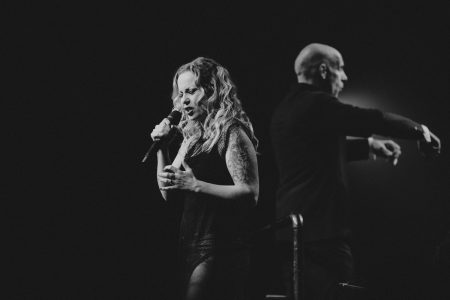
Anneke van Giersbergen in 013, photo Dani Silvia
It was never really, thoroughly clarified what caused the break-up.
“No. We just didn’t understand each other anymore. And I remember thinking, when I left the band, that our friendship was going to be over as well. That I would lose them forever, as friends. Obviously, we are very different characters, but we were friends, for sure. And it didn’t survive. That’s too bad. I had a very hard time explaining them about my decision. That it was a matter of the heart. That I not only wanted to make a solo album, but that I needed to do many more things. On my own. For me, and for my family too.”
It didn’t turn out to be a death sentence for The Gathering, but your announcement must have sounded like that to them.
“They understood that they had a problem. But then again: everything that gets thrown at our feet we must deal with, right? Without The Gathering, I had a fucking hard time getting my shit together. Many of The Gathering’s fans, being loyal as they are, they didn’t like me to leave either. I got criticized, which was not super cool, but hey, I was determined to do what I had in mind. Even if I didn’t know where to start, really, I knew I had to take the step. Make a change, which is very hard for a lot of people. For me too. And The Gathering was not on its way down, or anything like that. It wasn’t like I was leaving a sinking ship. That may have added to people’s confusion.”

VUUR, photo Dani Silvia
You were leaving on a high note.
“I didn’t think of high notes or sinking ships. I just needed to follow my urge. You know, I never spoke about this with any journalist since it happened.”
A two-way street
Tell me a little bit about your approach to social media. I like Anneke’s 60 Seconds Sunday on Instagram, that you came up with. Was there a moment that you realized: “Hey, now I am supposed to do all these social media as well?”
“Now that you mention it: can I record a little of this interview? Haha, I forgot about it… But yeah, I was thinking: ‘What if I record a bit of all the things I do in a week and edit it down to one minute?’ Because Instagram allows movies to a maximum length of one minute. I started doing it, and it turned out to be a good way to draw attention. It’s quite a lot of work, all the editing, the subtitling. But it made my following grow. And I like doing it!”
And Instagram is only one of the marketing platforms.
“Online marketing has become such a big thing for artists like me. I have accumulated a lot of followers over the years, so these platforms make it easy for me to show people what I am doing, and where I am, literally. With a concept like 60 Seconds Sunday people really get to know you on a personal level. And I like that. I know it’s not for everybody, which is okay, of course. But I’m like an open book. I like talking about everything, I show pictures of my son, and so on. Today there are so many bands online, there’s so much going on all the time, and life goes by so fast, that I feel it is nice to get to know a person a little closer now and then. Don’t you think? I share, and people share back. It’s a two-way street. And I don’t even tag a lot. It’s just that one minute, and that’s enough. When Devin comes on, he’ll say ‘Hi, this is Devin Townsend and you’re watching Anneke’s 60 Seconds Sunday!’ That should be enough! It’s an addition to all the random pics and other shit that I am putting out there.”
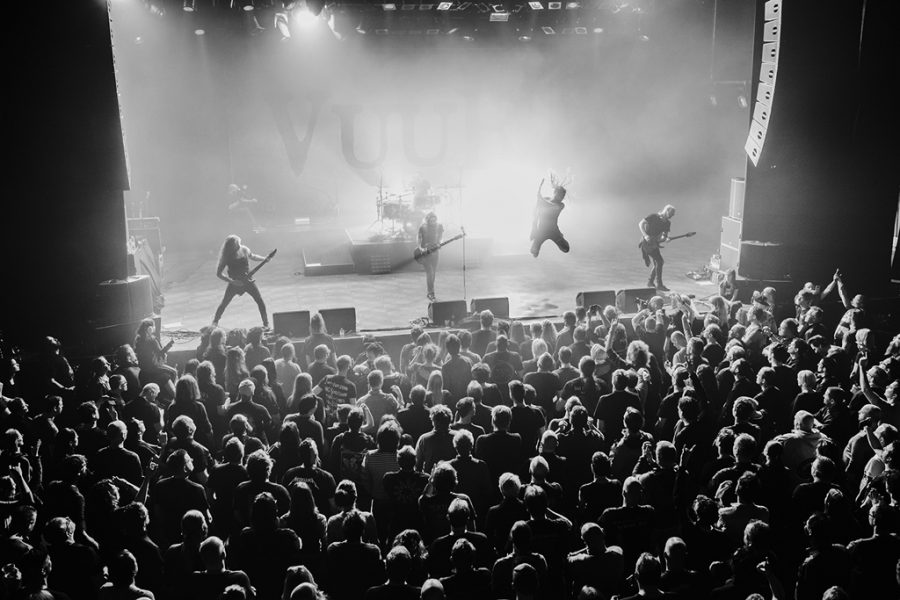
VUUR in Doornroosje, photo Dani Silvia
Are you actually studying that part of the business?
“Maybe not enough. I have Rob, of course, my husband and manager. And there’s Robbin, his assistant. She is much younger than we are, and she has lots of ideas for content. It can be random stuff, fast ways to get a message across, or more structured, something that may have a longer effect on my visibility. You know, I am used to working with people younger than I am. Like, most VUUR-members are at least ten years younger than I am. And Robbin is much younger still, and super smart. She keeps me on my toes. I tend to think of young people in terms of when I was twenty years old, but the game has changed to such an extent! I’m not really trying to attract a young audience, but it is good to learn through them what is happening and what works for them. Not just in social media but in music as well. It is good to keep up.”
Is there anybody that you are following in particular?
“It may sound weird, but I follow Madonna on Insta, just as well as Gerard Joling. Besides them a lot of metal bands, and fashion bloggers, you know, for fashion of people my age… It’s quite eclectic. And about Joling: he is soooo different from me, in personality, in genre, in his public appearances, but he is such a natural entertainer. And he makes me laugh a lot. I like seeing that, it can be inspiring. And Madonna, she’s my hero. To see how she is dealing with her career, as an ageing artist… You can see that she doesn’t like getting older. Which to me is strange. I like getting older, I don’t mind it at all. But she is creative, man. She’s a role model, for a long time already.”
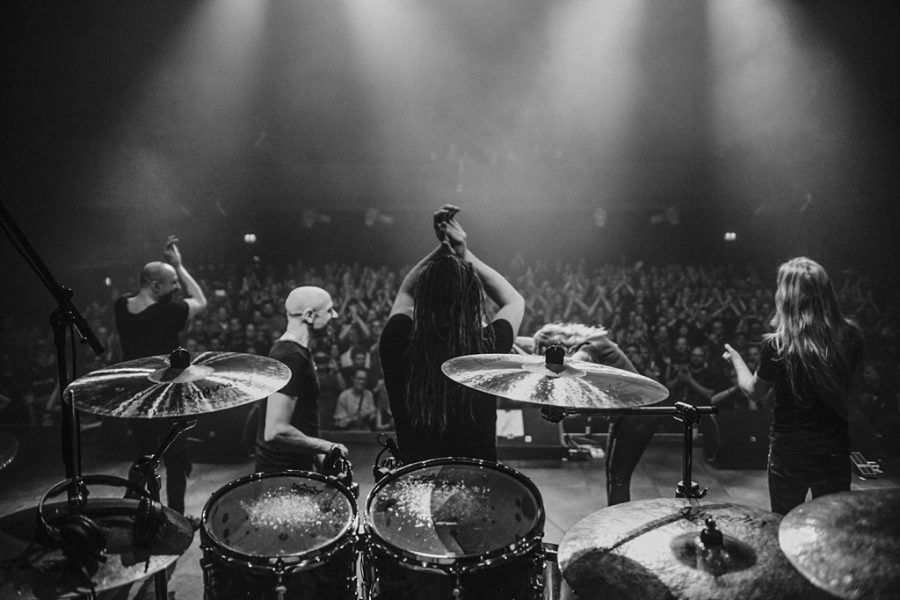
VUUR in Nijmegen, photo Dani Silvia
Chamber music, anyone?
Can you tell me a little bit about how your gigs with Kamerata Zuid came about? And is singing with a chamber orchestra very different from singing with a full orchestra like Residentie Orkest?
“Last year theatre Het Speelhuis in Helmond got renovated and I sang together with Kamerata Zuid at the grand opening. Kamerata Zuid are a string orchestra with young, talented players and a very open-minded conductor. It worked so well that we immediately started to make plans for a new collaboration. They have a very different to their work than Residentie Orkest. Residentie Orkest, as an orchestra, are more traditional. But their management is very open-minded as well, so I guess I like to work with orchestras that are open to new and exciting things. Or maybe I only get invited to work with orchestras that like to connect themselves with modern music. Either way, when I perform with Residentie Orkest, they don’t bring their full ensemble. It wouldn’t fit on the stag e of a pop venue, so in a way singing with them isn’t much different form singing with a chamber orchestra like Kamerata Zuid. With Kamerata Zuid I will do a short tour end of November, early December. Residentie Orkest and I will do another concert together in Paard in The Hague on May 16th next year. It’s all going to be awesome!”
Be sure to read Part 1 of A random life – 25 years of Anneke van Giersbergen as well!
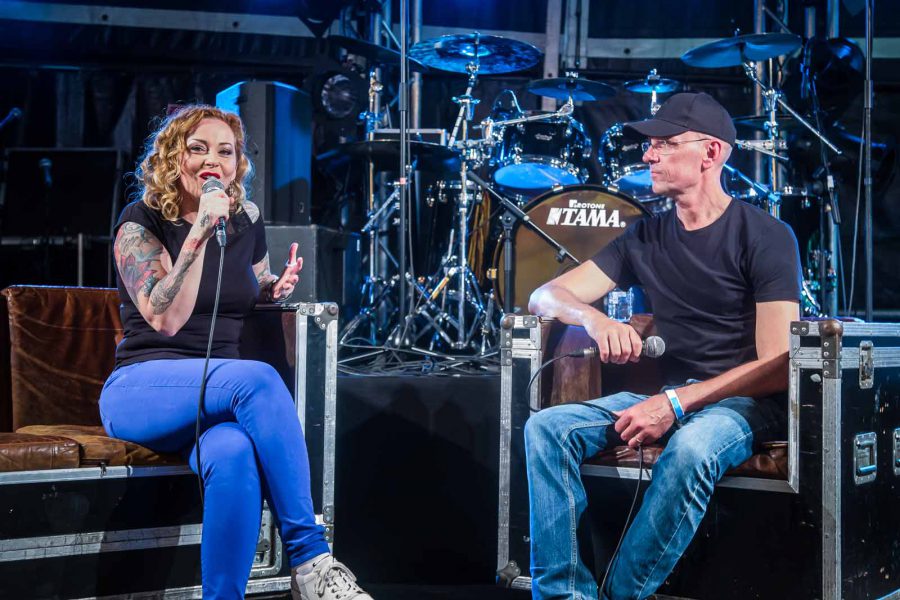
Anneke van Giersbergen & Mark van Schaick at FortaRock, foto BiancaBerger
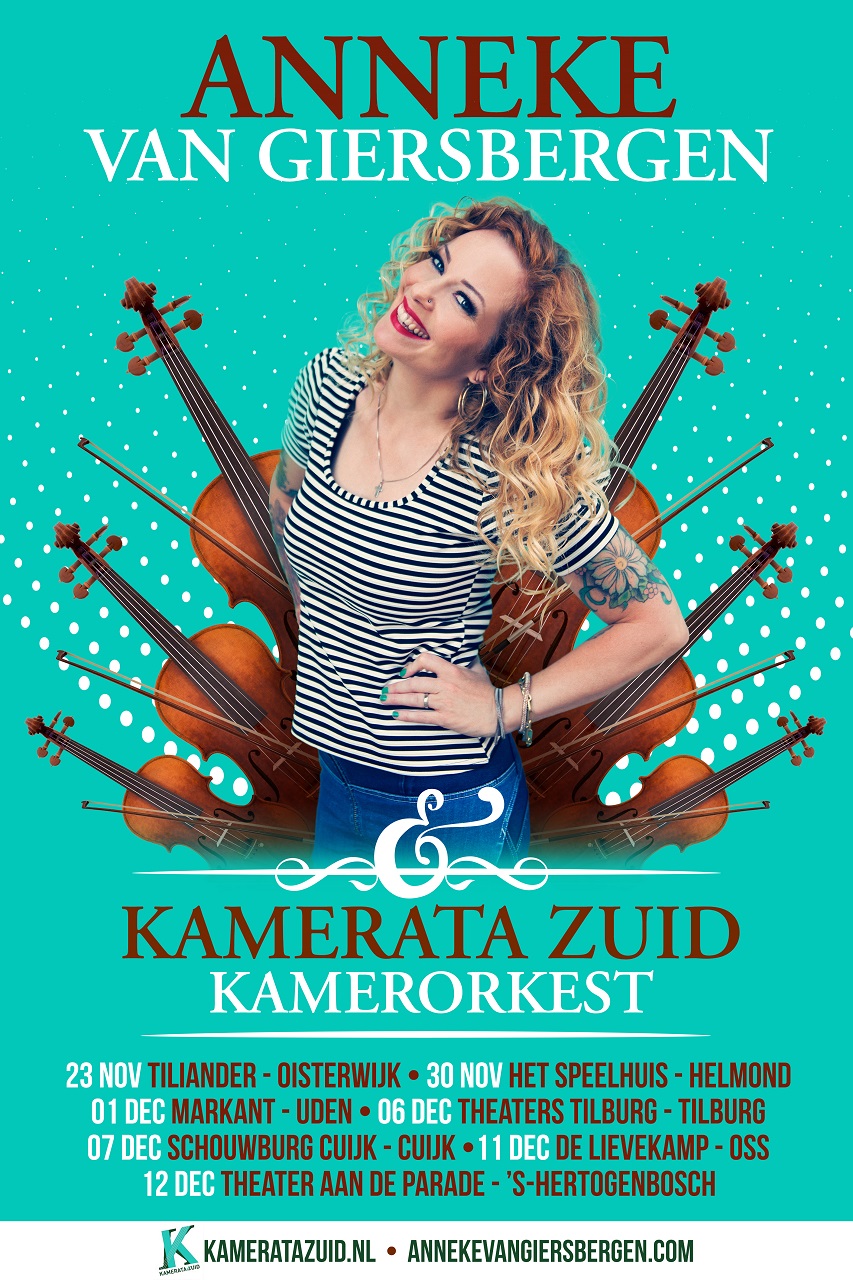
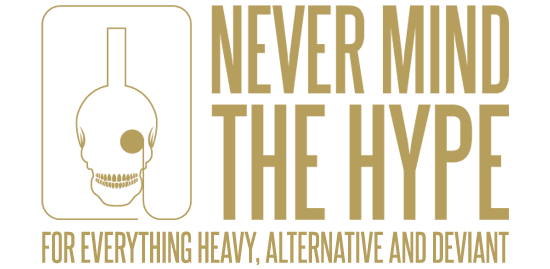
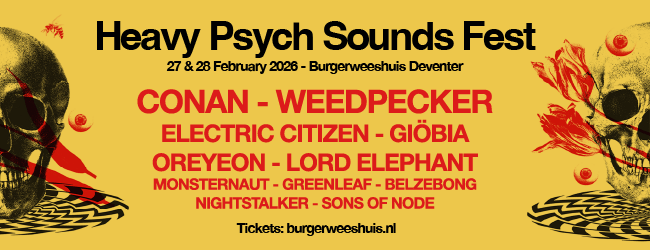
Nog geen reacties!
Er zijn nog geen reacties geplaatst.